大学英语教学改革培训心得体会
- 格式:docx
- 大小:16.75 KB
- 文档页数:4
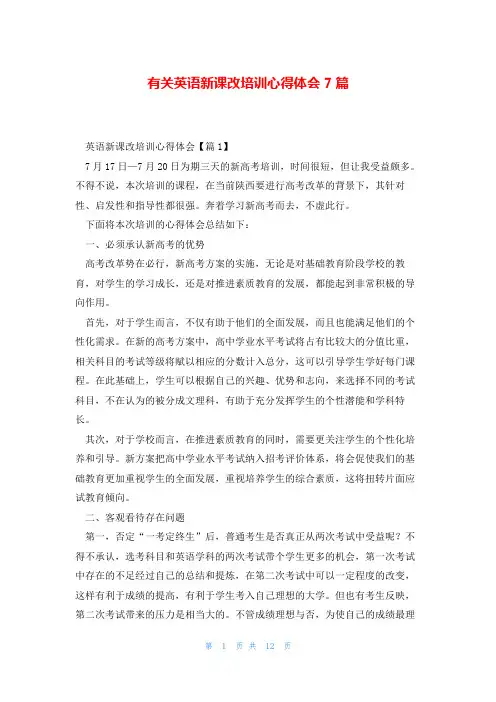
有关英语新课改培训心得体会7篇英语新课改培训心得体会【篇1】7月17日—7月20日为期三天的新高考培训,时间很短,但让我受益颇多。
不得不说,本次培训的课程,在当前陕西要进行高考改革的背景下,其针对性、启发性和指导性都很强。
奔着学习新高考而去,不虚此行。
下面将本次培训的心得体会总结如下:一、必须承认新高考的优势高考改革势在必行,新高考方案的实施,无论是对基础教育阶段学校的教育,对学生的学习成长,还是对推进素质教育的发展,都能起到非常积极的导向作用。
首先,对于学生而言,不仅有助于他们的全面发展,而且也能满足他们的个性化需求。
在新的高考方案中,高中学业水平考试将占有比较大的分值比重,相关科目的考试等级将赋以相应的分数计入总分,这可以引导学生学好每门课程。
在此基础上,学生可以根据自己的兴趣、优势和志向,来选择不同的考试科目,不在认为的被分成文理科,有助于充分发挥学生的个性潜能和学科特长。
其次,对于学校而言,在推进素质教育的同时,需要更关注学生的个性化培养和引导。
新方案把高中学业水平考试纳入招考评价体系,将会促使我们的基础教育更加重视学生的全面发展,重视培养学生的综合素质,这将扭转片面应试教育倾向。
二、客观看待存在问题第一,否定“一考定终生”后,普通考生是否真正从两次考试中受益呢?不得不承认,选考科目和英语学科的两次考试带个学生更多的机会,第一次考试中存在的不足经过自己的总结和提炼,在第二次考试中可以一定程度的改变,这样有利于成绩的提高,有利于学生考入自己理想的大学。
但也有考生反映,第二次考试带来的压力是相当大的。
不管成绩理想与否,为使自己的成绩最理想,学生基本都会选择两次考,河阳就造成学生一直要放不少的时间在这门课上,这势必影响其他学科的学习,实际上加重了学生的学业负担。
第二,“速成式”选考对学生掌握知识的“质”让人质疑。
原本三年完成的教学任务被缩成两年或者两年半的时间完成,让人对学生掌握知识的全面、完整和准确产生怀疑。
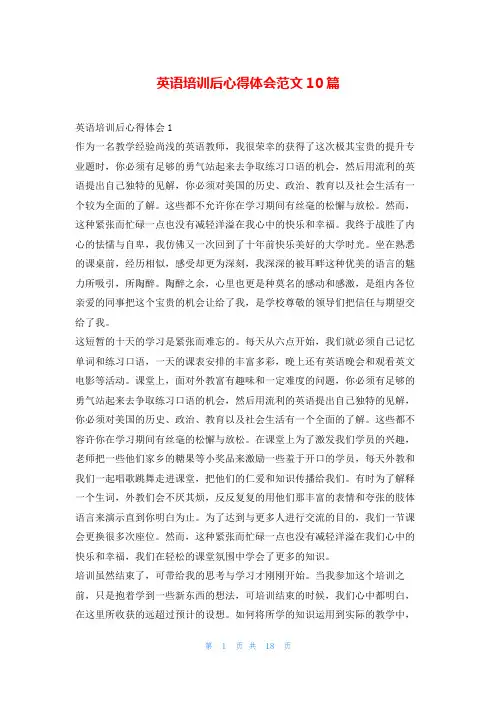
英语培训后心得体会范文10篇英语培训后心得体会1作为一名教学经验尚浅的英语教师,我很荣幸的获得了这次极其宝贵的提升专业题时,你必须有足够的勇气站起来去争取练习口语的机会,然后用流利的英语提出自己独特的见解,你必须对美国的历史、政治、教育以及社会生活有一个较为全面的了解。
这些都不允许你在学习期间有丝毫的松懈与放松。
然而,这种紧张而忙碌一点也没有减轻洋溢在我心中的快乐和幸福。
我终于战胜了内心的怯懦与自卑,我仿佛又一次回到了十年前快乐美好的大学时光。
坐在熟悉的课桌前,经历相似,感受却更为深刻,我深深的被耳畔这种优美的语言的魅力所吸引,所陶醉。
陶醉之余,心里也更是种莫名的感动和感激,是组内各位亲爱的同事把这个宝贵的机会让给了我,是学校尊敬的领导们把信任与期望交给了我。
这短暂的十天的学习是紧张而难忘的。
每天从六点开始,我们就必须自己记忆单词和练习口语,一天的课表安排的丰富多彩,晚上还有英语晚会和观看英文电影等活动。
课堂上,面对外教富有趣味和一定难度的问题,你必须有足够的勇气站起来去争取练习口语的机会,然后用流利的英语提出自己独特的见解,你必须对美国的历史、政治、教育以及社会生活有一个全面的了解。
这些都不容许你在学习期间有丝毫的松懈与放松。
在课堂上为了激发我们学员的兴趣,老师把一些他们家乡的糖果等小奖品来激励一些羞于开口的学员,每天外教和我们一起唱歌跳舞走进课堂,把他们的仁爱和知识传播给我们。
有时为了解释一个生词,外教们会不厌其烦,反反复复的用他们那丰富的表情和夸张的肢体语言来演示直到你明白为止。
为了达到与更多人进行交流的目的,我们一节课会更换很多次座位。
然而,这种紧张而忙碌一点也没有减轻洋溢在我们心中的快乐和幸福,我们在轻松的课堂氛围中学会了更多的知识。
培训虽然结束了,可带给我的思考与学习才刚刚开始。
当我参加这个培训之前,只是抱着学到一些新东西的想法,可培训结束的时候,我们心中都明白,在这里所收获的远超过预计的设想。
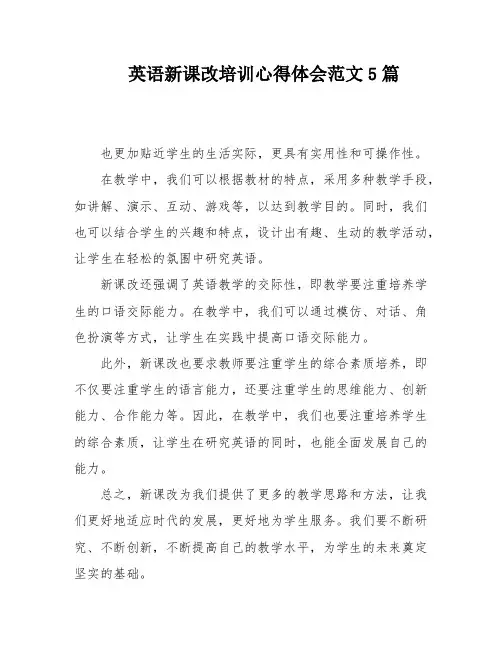
英语新课改培训心得体会范文5篇
也更加贴近学生的生活实际,更具有实用性和可操作性。
在教学中,我们可以根据教材的特点,采用多种教学手段,如讲解、演示、互动、游戏等,以达到教学目的。
同时,我们也可以结合学生的兴趣和特点,设计出有趣、生动的教学活动,让学生在轻松的氛围中研究英语。
新课改还强调了英语教学的交际性,即教学要注重培养学生的口语交际能力。
在教学中,我们可以通过模仿、对话、角色扮演等方式,让学生在实践中提高口语交际能力。
此外,新课改也要求教师要注重学生的综合素质培养,即不仅要注重学生的语言能力,还要注重学生的思维能力、创新能力、合作能力等。
因此,在教学中,我们也要注重培养学生的综合素质,让学生在研究英语的同时,也能全面发展自己的能力。
总之,新课改为我们提供了更多的教学思路和方法,让我们更好地适应时代的发展,更好地为学生服务。
我们要不断研究、不断创新,不断提高自己的教学水平,为学生的未来奠定坚实的基础。
2、课程改革实验教材的特点
总之,课程改革实验教材的设计不仅注重知识传授,更注重学生能力、情感、态度和价值观的培养,体现了新课程致力于学生全面发展的功能。
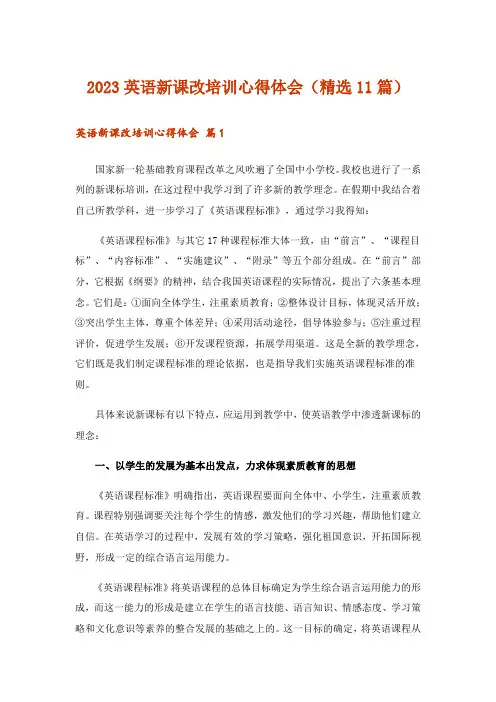
2023英语新课改培训心得体会(精选11篇)英语新课改培训心得体会篇1国家新一轮基础教育课程改革之风吹遍了全国中小学校。
我校也进行了一系列的新课标培训,在这过程中我学习到了许多新的教学理念。
在假期中我结合着自己所教学科,进一步学习了《英语课程标准》,通过学习我得知:《英语课程标准》与其它17种课程标准大体一致,由“前言”、“课程目标”、“内容标准”、“实施建议”、“附录”等五个部分组成。
在“前言”部分,它根据《纲要》的精神,结合我国英语课程的实际情况,提出了六条基本理念。
它们是:①面向全体学生,注重素质教育;②整体设计目标,体现灵活开放;③突出学生主体,尊重个体差异;④采用活动途径,倡导体验参与;⑤注重过程评价,促进学生发展;⑥开发课程资源,拓展学用渠道。
这是全新的教学理念,它们既是我们制定课程标准的理论依据,也是指导我们实施英语课程标准的准则。
具体来说新课标有以下特点,应运用到教学中,使英语教学中渗透新课标的理念:一、以学生的发展为基本出发点,力求体现素质教育的思想《英语课程标准》明确指出,英语课程要面向全体中、小学生,注重素质教育。
课程特别强调要关注每个学生的情感,激发他们的学习兴趣,帮助他们建立自信。
在英语学习的过程中,发展有效的学习策略,强化祖国意识,开拓国际视野,形成一定的综合语言运用能力。
《英语课程标准》将英语课程的总体目标确定为学生综合语言运用能力的形成,而这一能力的形成是建立在学生的语言技能、语言知识、情感态度、学习策略和文化意识等素养的整合发展的基础之上的。
这一目标的确定,将英语课程从仅仅关注知识与技能的培养提高到对学生整体素质的培养,使学生既有较强的英语语言运用的能力,又有自主学习能力和良好的个性品格,从而为终身学习和发展打下良好的基础。
二、分级课程体系,保证课程的整体性、灵活性和开放性《英语课程标准》从小学三年级至高中毕业整体设计英语课程,将英语课程的目标按能力水平设计为九个级别。
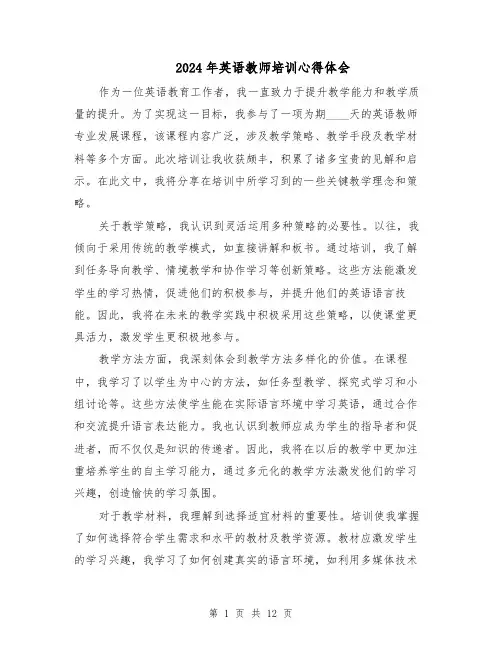
2024年英语教师培训心得体会作为一位英语教育工作者,我一直致力于提升教学能力和教学质量的提升。
为了实现这一目标,我参与了一项为期____天的英语教师专业发展课程,该课程内容广泛,涉及教学策略、教学手段及教学材料等多个方面。
此次培训让我收获颇丰,积累了诸多宝贵的见解和启示。
在此文中,我将分享在培训中所学习到的一些关键教学理念和策略。
关于教学策略,我认识到灵活运用多种策略的必要性。
以往,我倾向于采用传统的教学模式,如直接讲解和板书。
通过培训,我了解到任务导向教学、情境教学和协作学习等创新策略。
这些方法能激发学生的学习热情,促进他们的积极参与,并提升他们的英语语言技能。
因此,我将在未来的教学实践中积极采用这些策略,以使课堂更具活力,激发学生更积极地参与。
教学方法方面,我深刻体会到教学方法多样化的价值。
在课程中,我学习了以学生为中心的方法,如任务型教学、探究式学习和小组讨论等。
这些方法使学生能在实际语言环境中学习英语,通过合作和交流提升语言表达能力。
我也认识到教师应成为学生的指导者和促进者,而不仅仅是知识的传递者。
因此,我将在以后的教学中更加注重培养学生的自主学习能力,通过多元化的教学方法激发他们的学习兴趣,创造愉快的学习氛围。
对于教学材料,我理解到选择适宜材料的重要性。
培训使我掌握了如何选择符合学生需求和水平的教材及教学资源。
教材应激发学生的学习兴趣,我学习了如何创建真实的语言环境,如利用多媒体技术及实地考察等手段。
因此,未来我将积极寻找适合学生的教材和资源,创造更真实、生动的语言环境,以提升他们的语言表达能力和综合应用能力。
这次英语教师培训对我产生了深远影响。
在教学策略、教学方法和教学材料等多个层面,我积累了丰富的经验和启示。
我深信,通过灵活运用各种教学策略、采用多元化的教学方法以及选择恰当的教学材料,我将能提升教学质量,使学生在学习英语的过程中享受更多乐趣和成长。
我期待将所学知识和经验付诸实践,并不断反思和改进教学。
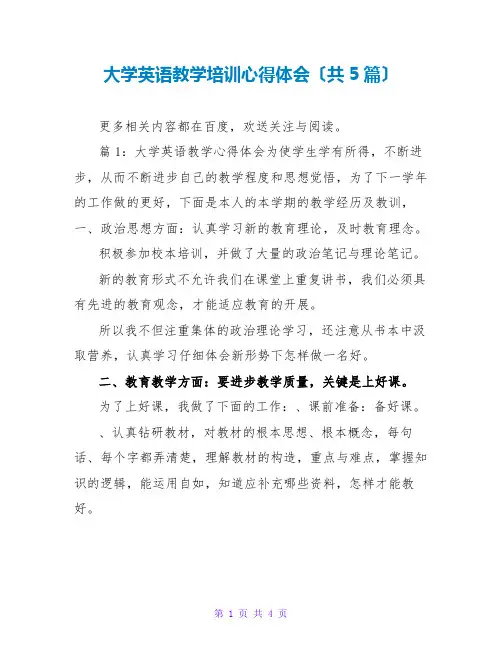
大学英语教学培训心得体会〔共5篇〕更多相关内容都在百度,欢送关注与阅读。
篇1:大学英语教学心得体会为使学生学有所得,不断进步,从而不断进步自己的教学程度和思想觉悟,为了下一学年的工作做的更好,下面是本人的本学期的教学经历及教训,一、政治思想方面:认真学习新的教育理论,及时教育理念。
积极参加校本培训,并做了大量的政治笔记与理论笔记。
新的教育形式不允许我们在课堂上重复讲书,我们必须具有先进的教育观念,才能适应教育的开展。
所以我不但注重集体的政治理论学习,还注意从书本中汲取营养,认真学习仔细体会新形势下怎样做一名好。
二、教育教学方面:要进步教学质量,关键是上好课。
为了上好课,我做了下面的工作:、课前准备:备好课。
、认真钻研教材,对教材的根本思想、根本概念,每句话、每个字都弄清楚,理解教材的构造,重点与难点,掌握知识的逻辑,能运用自如,知道应补充哪些资料,怎样才能教好。
、理解学生原有的知识技能的质量,他们的兴趣、需要、方法、习惯,学习新知识可能会有哪些困难,采取相应的预防措施。
、考虑教法,解决如何把已掌握的教材传授给学生,包括如何组织教材、如何安排每节课的活动。
、课堂上的情况。
组织好课堂教学,范文写作第5篇:英语教学培训心得体会英语教学培训心得体会近期,我参加了区教体局与老师进修学校组织的小学英语老师教学培训,虽然只有短暂的两周时间,但使我在思想上、业务理论上、工作理论上都受益匪浅,同时也看到了自己与别人的差距,明确了自己在教学上的奋斗目的,反思了以往工作中的缺乏,为我在今后教学工作中提供了良好的指导。
通过几位吕梁学院优秀老师的指导,使我的英语教育教学观念进一步得到更新。
以下是经过培训,我得到的一些简单的体会。
一、要根据本校本班学生的实际生情况,选择适宜的教学方法。
培训中,指导老师们提出了许多非常好的做法,有很多是经历之谈,有很多方法值得尝试。
但也有些方法不一定就实用于我所教学的班级,因此,我觉得作为老师,应该根据实际情况,探索合适自己和学生的教学方法,借鉴并变通使用别人成功的做法,要常反思,进而形成自己的教学风格,为进步课堂教学效率效劳二、要在教学策略和教学方法上做一些研究和理论。
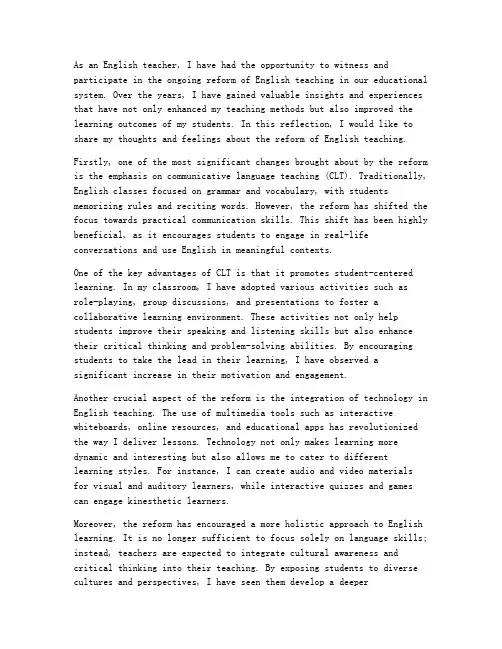
As an English teacher, I have had the opportunity to witness and participate in the ongoing reform of English teaching in our educational system. Over the years, I have gained valuable insights and experiences that have not only enhanced my teaching methods but also improved the learning outcomes of my students. In this reflection, I would like to share my thoughts and feelings about the reform of English teaching.Firstly, one of the most significant changes brought about by the reform is the emphasis on communicative language teaching (CLT). Traditionally, English classes focused on grammar and vocabulary, with students memorizing rules and reciting words. However, the reform has shifted the focus towards practical communication skills. This shift has been highly beneficial, as it encourages students to engage in real-life conversations and use English in meaningful contexts.One of the key advantages of CLT is that it promotes student-centered learning. In my classroom, I have adopted various activities such asrole-playing, group discussions, and presentations to foster a collaborative learning environment. These activities not only help students improve their speaking and listening skills but also enhance their critical thinking and problem-solving abilities. By encouraging students to take the lead in their learning, I have observed a significant increase in their motivation and engagement.Another crucial aspect of the reform is the integration of technology in English teaching. The use of multimedia tools such as interactive whiteboards, online resources, and educational apps has revolutionized the way I deliver lessons. Technology not only makes learning more dynamic and interesting but also allows me to cater to different learning styles. For instance, I can create audio and video materialsfor visual and auditory learners, while interactive quizzes and games can engage kinesthetic learners.Moreover, the reform has encouraged a more holistic approach to English learning. It is no longer sufficient to focus solely on language skills; instead, teachers are expected to integrate cultural awareness and critical thinking into their teaching. By exposing students to diverse cultures and perspectives, I have seen them develop a deeperappreciation for the English language and its rich history. This approach has also helped students become more empathetic and open-minded individuals.However, the reform has not been without its challenges. One of the main difficulties I have encountered is the time constraint. With the increased emphasis on practical skills and cultural understanding, it can be challenging to cover the required curriculum within the limited time frame. To address this issue, I have had to become more efficientin my teaching methods, such as creating concise lesson plans and using innovative techniques to maximize learning outcomes.Furthermore, the reform has necessitated a change in my professional development. As a teacher, I have had to stay updated with the latest trends and research in English teaching. This has involved attending workshops, participating in online courses, and engaging in continuous professional learning. Although this has been demanding, it has also been incredibly rewarding, as it has allowed me to grow both as an educator and as an individual.In conclusion, the reform of English teaching has had a profound impact on my teaching practice and the learning experiences of my students. By embracing communicative language teaching, integrating technology, and adopting a holistic approach, I have witnessed significant improvements in my students' language proficiency and overall development. While the reform has presented challenges, it has also opened doors to new opportunities for growth and innovation. As an English teacher, I am committed to embracing these changes and continuing to adapt my teaching methods to meet the evolving needs of my students.。
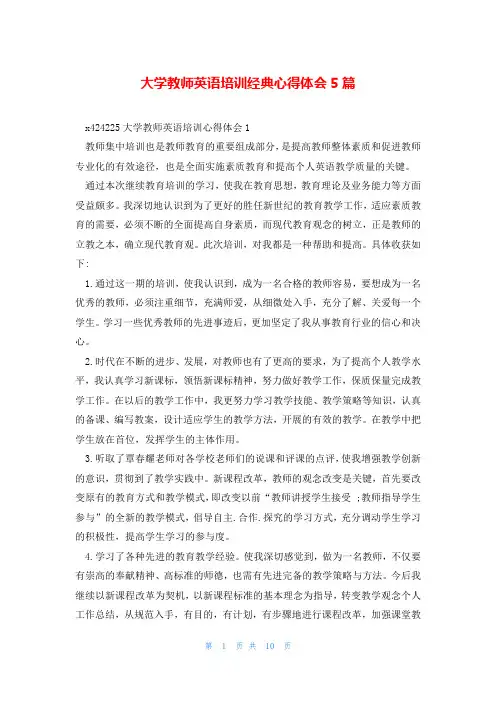
大学教师英语培训经典心得体会5篇x424225大学教师英语培训心得体会1教师集中培训也是教师教育的重要组成部分,是提高教师整体素质和促进教师专业化的有效途径,也是全面实施素质教育和提高个人英语教学质量的关键。
通过本次继续教育培训的学习,使我在教育思想,教育理论及业务能力等方面受益颇多。
我深切地认识到为了更好的胜任新世纪的教育教学工作,适应素质教育的需要,必须不断的全面提高自身素质,而现代教育观念的树立,正是教师的立教之本,确立现代教育观。
此次培训,对我都是一种帮助和提高。
具体收获如下:1.通过这一期的培训,使我认识到,成为一名合格的教师容易,要想成为一名优秀的教师,必须注重细节,充满师爱,从细微处入手,充分了解、关爱每一个学生。
学习一些优秀教师的先进事迹后,更加坚定了我从事教育行业的信心和决心。
2.时代在不断的进步、发展,对教师也有了更高的要求,为了提高个人教学水平,我认真学习新课标,领悟新课标精神,努力做好教学工作,保质保量完成教学工作。
在以后的教学工作中,我更努力学习教学技能、教学策略等知识,认真的备课、编写教案,设计适应学生的教学方法,开展的有效的教学。
在教学中把学生放在首位,发挥学生的主体作用。
3.听取了覃春耀老师对各学校老师们的说课和评课的点评,使我增强教学创新的意识,贯彻到了教学实践中。
新课程改革,教师的观念改变是关键,首先要改变原有的教育方式和教学模式,即改变以前“教师讲授学生接受 ;教师指导学生参与”的全新的教学模式,倡导自主.合作.探究的学习方式,充分调动学生学习的积极性,提高学生学习的参与度。
4.学习了各种先进的教育教学经验。
使我深切感觉到,做为一名教师,不仅要有崇高的奉献精神、高标准的师德,也需有先进完备的教学策略与方法。
今后我继续以新课程改革为契机,以新课程标准的基本理念为指导,转变教学观念个人工作总结,从规范入手,有目的,有计划,有步骤地进行课程改革,加强课堂教学改革研究,提高自身教学业务水平。
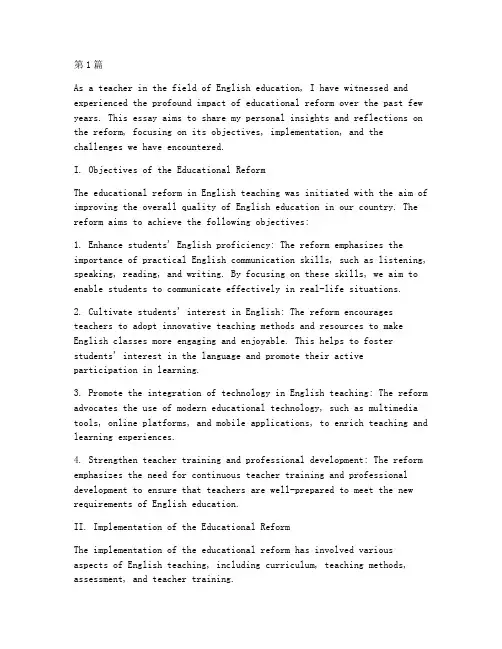
第1篇As a teacher in the field of English education, I have witnessed and experienced the profound impact of educational reform over the past few years. This essay aims to share my personal insights and reflections on the reform, focusing on its objectives, implementation, and the challenges we have encountered.I. Objectives of the Educational ReformThe educational reform in English teaching was initiated with the aim of improving the overall quality of English education in our country. The reform aims to achieve the following objectives:1. Enhance students' English proficiency: The reform emphasizes the importance of practical English communication skills, such as listening, speaking, reading, and writing. By focusing on these skills, we aim to enable students to communicate effectively in real-life situations.2. Cultivate students' interest in English: The reform encourages teachers to adopt innovative teaching methods and resources to make English classes more engaging and enjoyable. This helps to foster students' interest in the language and promote their activeparticipation in learning.3. Promote the integration of technology in English teaching: The reform advocates the use of modern educational technology, such as multimedia tools, online platforms, and mobile applications, to enrich teaching and learning experiences.4. Strengthen teacher training and professional development: The reform emphasizes the need for continuous teacher training and professional development to ensure that teachers are well-prepared to meet the new requirements of English education.II. Implementation of the Educational ReformThe implementation of the educational reform has involved various aspects of English teaching, including curriculum, teaching methods, assessment, and teacher training.1. Curriculum reform: The reform has led to the development of new English textbooks that focus on practical communication skills and cultural awareness. These textbooks provide a more balanced approach to language learning, with equal emphasis on all four language skills.2. Teaching methods: Teachers are encouraged to adopt a variety of teaching methods, such as task-based learning, project-based learning, and collaborative learning. These methods promote active learning and encourage students to engage in meaningful language activities.3. Assessment: The reform has shifted from traditional paper-and-pencil tests to more comprehensive and diverse assessment methods, such as oral presentations, group projects, and self-assessment. This helps to better evaluate students' language proficiency and learning progress.4. Teacher training: The reform has emphasized the importance of teacher training and professional development. Many teachers have participatedin workshops, seminars, and online courses to enhance their teaching skills and keep up with the latest trends in English education.III. Challenges and SolutionsDespite the positive outcomes of the educational reform, we have encountered several challenges in its implementation. Here are some of the challenges and the corresponding solutions:1. Resistance to change: Some teachers may be resistant to adopting new teaching methods and resources. To address this, it is essential to provide adequate training and support to help them adapt to the reform.2. Limited resources: In some schools, there may be a lack of resources, such as textbooks, multimedia tools, and internet access. To overcome this, schools should work together with educational authorities and communities to secure necessary resources.3. Uneven implementation: The reform may not be implemented uniformly across all regions and schools. To ensure equitable access to quality English education, it is crucial to monitor and evaluate the reform's progress and provide targeted support to schools in need.4. Student diversity: Students have different learning styles, abilities, and backgrounds. Teachers need to adapt their teaching approaches to cater to the diverse needs of their students. This can be achieved through differentiation and personalized learning strategies.IV. ConclusionIn conclusion, the educational reform in English teaching has brought about significant improvements in the quality of English education inour country. By focusing on practical communication skills, fostering student interest, promoting technology integration, and strengthening teacher training, the reform has laid a solid foundation for the development of English proficiency in students.However, challenges still remain in its implementation. By addressing these challenges and continuously improving the reform, we can ensurethat English education remains dynamic, effective, and inclusive, preparing students for success in the globalized world. As an English teacher, I am committed to embracing the reform and contributing to its success, ultimately enhancing the English proficiency and overall development of my students.第2篇As an English teacher, I have been witnessing and experiencing thereform of English education in our country for several years. Thisreform has brought about significant changes in the teaching methods, curriculum, and evaluation systems. In this essay, I will share my reflections on the reform of English education and its impact on students, teachers, and the overall education system.Firstly, the reform of English education has focused on fostering students' comprehensive language skills, including listening, speaking, reading, and writing. In the past, English education mainly emphasized grammar and vocabulary, which often led to students' poor speaking and listening abilities. However, with the reform, more emphasis is placedon practical language use, encouraging students to engage in real-lifecommunication. This shift has had a positive impact on students' language proficiency.One of the most noticeable changes in the reform is the introduction of communicative language teaching methods. Teachers are now encouraged to create a more interactive and student-centered classroom environment. This approach has several advantages. Firstly, it helps students to overcome their fear of speaking and improve their confidence in using English. Secondly, it promotes critical thinking and problem-solving skills, as students are required to actively participate in discussions and activities. Lastly, it makes the learning process more enjoyable and engaging, which is essential for long-term language acquisition.Another significant change brought about by the reform is the adjustment of the curriculum. The new curriculum focuses on developing students' language skills in a balanced manner, ensuring that all aspects of language learning are given due attention. This includes not only the basic grammar and vocabulary but also cultural knowledge and language functions. By incorporating more cultural content into the curriculum, students can better understand the context in which English is used, making their language learning more meaningful and practical.Moreover, the reform has also changed the evaluation system of English education. Traditional tests, which primarily measured students' knowledge of grammar and vocabulary, have been replaced by more diverse and comprehensive assessment methods. These methods include speaking tests, listening tests, reading comprehension, and writing tasks. This shift has helped to reduce the pressure on students and promote a more holistic evaluation of their language abilities.From a teacher's perspective, the reform has presented both challenges and opportunities. On one hand, teachers need to adapt to new teaching methods and materials, which requires continuous professional development. On the other hand, the reform has allowed teachers to be more creative and innovative in their teaching practices. For example, teachers can now incorporate more technology into their lessons, such as using educational apps and online resources, which can enhance the learning experience for students.However, it is important to acknowledge that the reform of English education is not without its challenges. One of the main concerns is the availability of resources. In some schools, especially in rural areas, there may be a lack of teaching materials, technology, and qualified teachers. This can hinder the implementation of the new curriculum and affect students' learning outcomes. Additionally, the reform may require more time and effort from teachers, as they need to plan and prepare more diverse and engaging lessons.In conclusion, the reform of English education in our country has brought about significant changes that have the potential to improve students' language proficiency and overall education experience. By focusing on comprehensive language skills, incorporating cultural content, and adopting communicative teaching methods, the reform aims to prepare students for real-life communication and global challenges. As teachers, we need to embrace these changes and continuously develop our skills to meet the needs of our students. While the reform faces some challenges, its potential benefits far outweigh the drawbacks, and it is an essential step towards improving the quality of English education in our country.第3篇Introduction:As an English teacher, I have witnessed and experienced the educational reform in English teaching over the years. This reform aims to improve the quality of English education and foster students' comprehensive English proficiency. In this essay, I would like to share my reflections on the educational reform in English teaching, focusing on its objectives, challenges, and impacts.I. Objectives of the Educational Reform1. Emphasizing Communicative Language Teaching (CLT)The reform emphasizes the importance of communicative language teaching, which emphasizes interaction and communication over memorization and grammar rules. This approach helps students develop their speaking andlistening skills, making them more confident and competent in real-life situations.2. Integrating Language and CultureThe reform emphasizes the integration of language and culture, encouraging students to learn about the cultural background of the English-speaking world. This not only broadens their horizons but also enhances their understanding and appreciation of other cultures.3. Promoting Autonomous LearningThe reform aims to promote autonomous learning by equipping students with the necessary skills and strategies to learn English independently. This includes self-study, self-assessment, and critical thinking.4. Assessing Students' Comprehensive ProficiencyThe reform focuses on assessing students' comprehensive proficiency in English, including listening, speaking, reading, and writing. This comprehensive assessment helps identify students' strengths and weaknesses, allowing teachers to tailor their teaching methods accordingly.II. Challenges in the Educational Reform1. Resistance from Traditional TeachersThe reform has faced resistance from some traditional teachers who are accustomed to the old teaching methods. They may find it challenging to adapt to the new approach, which requires a more interactive andstudent-centered classroom environment.2. Inadequate ResourcesThe reform requires a wealth of resources, including textbooks, teaching materials, and technology. However, in some schools, inadequate resources may hinder the implementation of the reform.3. Assessment ChallengesThe reform aims to assess students' comprehensive proficiency, which requires a more complex and diverse assessment method. However, designing and implementing such assessments can be challenging for teachers.III. Impacts of the Educational Reform1. Enhanced Learning ExperienceThe reform has brought about a more engaging and interactive learning experience for students. They are more motivated and interested in learning English, as they are encouraged to use the language in real-life situations.2. Improved Language SkillsThe reform has helped students improve their language skills,particularly speaking and listening. As a result, they are more confident and competent in using English to communicate with others.3. Cultural AwarenessThe reform has fostered students' cultural awareness and appreciation of other cultures. This has not only enriched their knowledge but also prepared them to become global citizens.4. Teacher DevelopmentThe reform has prompted teachers to develop their teaching skills and knowledge. They are encouraged to engage in continuous professional development to keep up with the latest trends and methods in English teaching.Conclusion:The educational reform in English teaching has brought about significant changes and improvements. While it faces challenges, its objectives and impacts are undeniable. As an English teacher, I am committed to embracing and implementing the reform to provide the best possible learning experience for my students. Through continuous efforts and collaboration, we can achieve the ultimate goal of fostering ageneration of English-speaking individuals who are confident, competent, and culturally aware.。
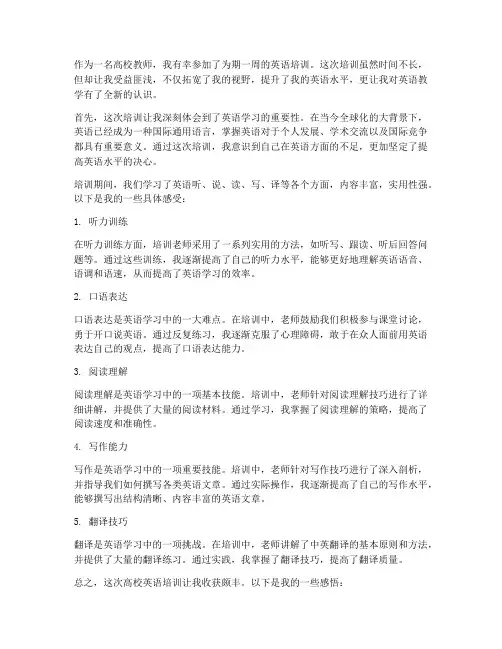
作为一名高校教师,我有幸参加了为期一周的英语培训。
这次培训虽然时间不长,但却让我受益匪浅,不仅拓宽了我的视野,提升了我的英语水平,更让我对英语教学有了全新的认识。
首先,这次培训让我深刻体会到了英语学习的重要性。
在当今全球化的大背景下,英语已经成为一种国际通用语言,掌握英语对于个人发展、学术交流以及国际竞争都具有重要意义。
通过这次培训,我意识到自己在英语方面的不足,更加坚定了提高英语水平的决心。
培训期间,我们学习了英语听、说、读、写、译等各个方面,内容丰富,实用性强。
以下是我的一些具体感受:1. 听力训练在听力训练方面,培训老师采用了一系列实用的方法,如听写、跟读、听后回答问题等。
通过这些训练,我逐渐提高了自己的听力水平,能够更好地理解英语语音、语调和语速,从而提高了英语学习的效率。
2. 口语表达口语表达是英语学习中的一大难点。
在培训中,老师鼓励我们积极参与课堂讨论,勇于开口说英语。
通过反复练习,我逐渐克服了心理障碍,敢于在众人面前用英语表达自己的观点,提高了口语表达能力。
3. 阅读理解阅读理解是英语学习中的一项基本技能。
培训中,老师针对阅读理解技巧进行了详细讲解,并提供了大量的阅读材料。
通过学习,我掌握了阅读理解的策略,提高了阅读速度和准确性。
4. 写作能力写作是英语学习中的一项重要技能。
培训中,老师针对写作技巧进行了深入剖析,并指导我们如何撰写各类英语文章。
通过实际操作,我逐渐提高了自己的写作水平,能够撰写出结构清晰、内容丰富的英语文章。
5. 翻译技巧翻译是英语学习中的一项挑战。
在培训中,老师讲解了中英翻译的基本原则和方法,并提供了大量的翻译练习。
通过实践,我掌握了翻译技巧,提高了翻译质量。
总之,这次高校英语培训让我收获颇丰。
以下是我的一些感悟:1. 英语学习是一个持续的过程,需要我们不断努力、持之以恒。
2. 英语学习要注重实践,通过多听、多说、多读、多写、多译来提高自己的英语水平。
3. 英语学习要关注细节,掌握各种技巧,才能在考试和实际应用中游刃有余。
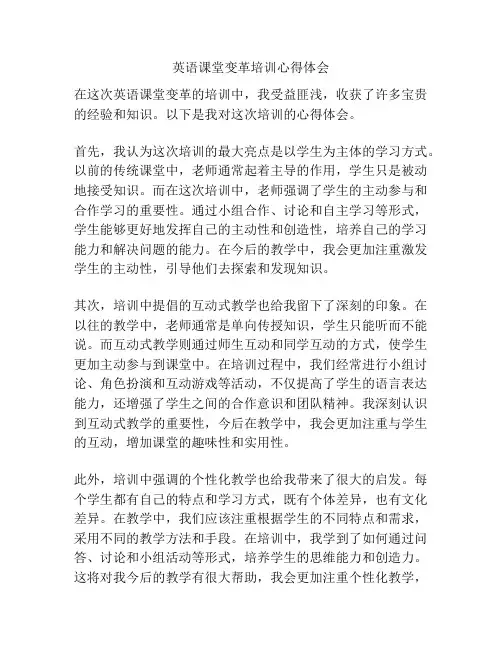
英语课堂变革培训心得体会在这次英语课堂变革的培训中,我受益匪浅,收获了许多宝贵的经验和知识。
以下是我对这次培训的心得体会。
首先,我认为这次培训的最大亮点是以学生为主体的学习方式。
以前的传统课堂中,老师通常起着主导的作用,学生只是被动地接受知识。
而在这次培训中,老师强调了学生的主动参与和合作学习的重要性。
通过小组合作、讨论和自主学习等形式,学生能够更好地发挥自己的主动性和创造性,培养自己的学习能力和解决问题的能力。
在今后的教学中,我会更加注重激发学生的主动性,引导他们去探索和发现知识。
其次,培训中提倡的互动式教学也给我留下了深刻的印象。
在以往的教学中,老师通常是单向传授知识,学生只能听而不能说。
而互动式教学则通过师生互动和同学互动的方式,使学生更加主动参与到课堂中。
在培训过程中,我们经常进行小组讨论、角色扮演和互动游戏等活动,不仅提高了学生的语言表达能力,还增强了学生之间的合作意识和团队精神。
我深刻认识到互动式教学的重要性,今后在教学中,我会更加注重与学生的互动,增加课堂的趣味性和实用性。
此外,培训中强调的个性化教学也给我带来了很大的启发。
每个学生都有自己的特点和学习方式,既有个体差异,也有文化差异。
在教学中,我们应该注重根据学生的不同特点和需求,采用不同的教学方法和手段。
在培训中,我学到了如何通过问答、讨论和小组活动等形式,培养学生的思维能力和创造力。
这将对我今后的教学有很大帮助,我会更加注重个性化教学,关注每个学生的成长和发展。
最后,培训中的案例分析和实际操作使我真正体验到了课堂变革的魅力。
通过反思我们自己的教学案例,我们可以发现自己在教学中存在的问题和不足之处,进一步加强自己的教学能力。
而通过实际操作,我们可以真正体验到新的教学模式和方式的好处和效果。
这个过程不仅让我感受到了教育的乐趣,也让我对自己的教学能力充满了信心和动力。
今后,我会继续努力,不断改进自己的教学方法,为学生提供更好的教育。
英语培训体会心得精选8篇(经典版)编制人:__________________审核人:__________________审批人:__________________编制单位:__________________编制时间:____年____月____日序言下载提示:该文档是本店铺精心编制而成的,希望大家下载后,能够帮助大家解决实际问题。
文档下载后可定制修改,请根据实际需要进行调整和使用,谢谢!并且,本店铺为大家提供各种类型的经典范文,如工作报告、工作计划、心得体会、汇报材料、条据文书、合同协议、规章制度、教学资料、作文大全、其他范文等等,想了解不同范文格式和写法,敬请关注!Download tips: This document is carefully compiled by this editor. I hope that after you download it, it can help you solve practical problems. The document can be customized and modified after downloading, please adjust and use it according to actual needs, thank you!Moreover, our store provides various types of classic sample essays, such as work reports, work plans, insights, reporting materials, documentary evidence, contract agreements, rules and regulations, teaching materials, complete essays, and other sample essays. If you would like to learn about different sample formats and writing methods, please pay attention!英语培训体会心得精选8篇心得体会是我们在实践中的心灵感悟和体验,通过总结心得体会,我们能够更好地认识自己的优势和劣势,本店铺今天就为您带来了英语培训体会心得精选8篇,相信一定会对你有所帮助。
近年来,随着我国教育事业的发展,大学英语教学改革也在不断深化。
我有幸参加了学校举办的大学英语改革讲座,通过这次讲座,我对大学英语改革有了更深入的了解,同时也对自己的英语学习有了新的认识和思考。
以下是我对这次讲座的心得体会。
一、改革背景及意义1. 改革背景随着全球化进程的加快,英语作为国际通用语言,其重要性日益凸显。
然而,我国大学英语教学长期以来存在着一些问题,如课程设置不合理、教学方法单一、评价体系不完善等。
这些问题严重制约了大学英语教学质量的提高。
为了适应新时代人才培养的需要,我国教育部于2017年发布了《大学英语教学指南》,对大学英语教学改革提出了明确要求。
此次讲座正是基于这一背景,旨在帮助教师和学生更好地理解和实施大学英语教学改革。
2. 改革意义(1)提高英语教学质量:通过改革,优化课程设置,创新教学方法,完善评价体系,从而提高大学英语教学质量。
(2)培养学生的英语综合应用能力:改革旨在培养学生的听、说、读、写、译等英语综合应用能力,使其能够适应国际化发展的需要。
(3)激发学生的学习兴趣:改革将关注学生的个性化需求,激发学生的学习兴趣,提高学生的学习积极性。
二、改革内容1. 课程设置(1)减少必修课学时,增加选修课比例,满足学生个性化需求。
(2)增加实用英语课程,如商务英语、旅游英语等,提高学生的实际应用能力。
2. 教学方法(1)倡导以学生为中心的教学模式,注重培养学生的自主学习能力。
(2)运用多媒体、网络等现代教育技术,丰富教学手段。
(3)加强课堂互动,提高学生的口语表达能力。
3. 评价体系(1)采用形成性评价与终结性评价相结合的方式,关注学生的学习过程和结果。
(2)评价内容多样化,包括课堂表现、作业、考试等。
三、个人体会1. 认识到英语学习的重要性通过讲座,我深刻认识到英语在国际交流中的重要作用。
作为一名大学生,我们要充分利用大学英语课程,提高自己的英语水平,为未来的发展打下坚实基础。
大学英语教师培训心得体会作为一名大学英语教师,我深知教学能力的提升对于教育质量的重要性。
近期参加的一场针对大学英语教师的专业培训,不仅为我提供了宝贵的学习机会,也让我深刻体会到了作为教师不断学习和进步的必要性。
培训的第一课便是关于教育理念的更新。
在信息爆炸的时代,传统的教学方法已经难以满足学生的需求。
现代教育强调以学生为中心,这就要求我们教师要转变角色,从知识的传授者变为学习的引导者和促进者。
这堂课让我意识到,作为教师,我们不仅要教会学生知识,更要教会他们如何学习,如何独立思考和解决问题。
接下来的一系列工作坊和互动环节,让我有机会实践新的教学策略。
通过小组讨论、角色扮演和案例分析等形式,我与其他教师共同探讨了如何在课堂上激发学生的学习兴趣,提高他们的参与度。
这些活动不仅增强了我的团队协作能力,也锻炼了我的创新思维。
培训中还包括了对现代教育技术的深入探讨。
随着多媒体和互联网技术的发展,数字化教学工具已经成为现代教育的重要组成部分。
我学习了如何使用在线平台和软件来辅助教学,如何制作电子教案和互动课件,以及如何利用网络资源丰富教学内容。
这些技能的学习和应用,无疑将极大地提高我的教学效率和学生的学习体验。
在培训的过程中,我还特别关注了评价体系的构建。
合理的评价体系能够准确地反映学生的学习情况,帮助教师及时调整教学策略。
通过对各种评价方法的学习和比较,我认识到了形成性评价的重要性。
这种评价方式强调过程而非结果,能够鼓励学生积极参与学习过程,同时也为教师提供了更多的反馈信息,以便更好地指导学生的学习。
培训还特别强调了教师个人发展的重要性。
在教育领域,持续的自我提升是必不可少的。
培训中的专家们分享了自己的经验和见解,鼓励我们要有终身学习的观念,不断追求专业发展。
他们的话语深深触动了我,让我意识到作为教师,我们的学习永远不会停止。
总结这次培训的心得体会,我深感受益匪浅。
不仅更新了教育理念,掌握了先进的教学方法和技术,还学会了如何构建有效的评价体系,更重要的是,我认识到了作为教师不断学习和成长的重要性。
2024年大学英语教学心得体会英语教学,作为高等教育的重要组成部分,承载着培养学生语言技能、跨文化交流能力以及自主学习能力的重任。
在大学英语教学的实践过程中,我深切体会到了教学相长的魅力,同时也认识到了不断提升自身教学水平和学生学习效果的重要性。
教学目标的明确与实现在大学英语教学过程中,我首先明确了教学目标:不仅要传授语言知识,更要培养学生的语言运用能力。
为此,我注重在课堂上创设情境,引导学生通过角色扮演、小组讨论等方式进行实践,使他们在真实的环境中运用英语,提高他们的听说能力。
同时,我还鼓励学生通过阅读英文原著、观看英文电影等方式,拓宽他们的视野,增强他们的跨文化意识。
教学方法的创新与优化传统的教学方法往往注重教师的讲解和学生的听讲,但在大学英语教学中,我尝试采用多种教学方法,如任务型教学、合作学习、翻转课堂等,以激发学生的学习兴趣和主动性。
例如,在任务型教学中,我设计了一系列与现实生活紧密相关的任务,让学生在完成任务的过程中,用英语进行沟通和交流,从而提高了他们的英语应用能力。
学生主体性的发挥与引导在英语教学中,我始终坚持学生为主体,教师为主导的教学理念。
我鼓励学生积极参与课堂活动,大胆表达自己的观点,同时也注重对他们的引导。
当学生出现语言错误时,我并不是直接指出,而是通过提问、引导等方式,让他们自己意识到错误并改正。
这样,学生不仅能够在轻松愉快的氛围中学习英语,还能够培养他们的自主学习能力。
课堂互动与氛围的营造课堂互动是英语教学的重要环节。
我注重在课堂上营造积极、互动的学习氛围。
我鼓励学生之间的交流和合作,让他们在英语学习中互相帮助、共同进步。
同时,我也注重与学生的互动,通过提问、讨论等方式,引导学生深入思考,激发他们的创新思维。
评估与反馈机制的完善在教学过程中,我建立了完善的评估与反馈机制。
通过定期的测试、作业和课堂表现等方式,我能够及时了解学生的学习情况,并针对他们的问题和不足进行有针对性的指导和帮助。
大学英语教学培训心得大学英语教学培训心得篇1我有幸参加了西安市英语教师在西安外国语大学为期10天的培训,本次培训虽然时间不长,却使我受益匪浅。
不仅使我增长了见识,开阔了视野,也使我的思想观念也发生了深刻的变化。
本次培训对我来说真是一个提高自身专业素质及能力的好机会,为我今后的英语学习和教学指明了方向。
本次培训人数众多,西安市中小学英语教师共100多人,我们中小学老师分班开展培训。
有多位教学经验丰富的专家教授、有从国外留学归来的博士生和优秀的教学一线的老师对我们进行培训。
授课专家的讲座异彩纷呈,各具特色。
这10天,我感受颇丰。
专家们的理论阐述给人启迪,促人反省,让我们欣赏了专家的风采,开阔了眼界,拓宽了思维,了解掌握了英语教育教学的的规律与方法。
课程内容有解读英语新课标、如何培养小学生写作能力、英语课内活动和课外活动设计、国际视野下的英语基储现代国际礼仪与教师修养、课程改革背景下的教师专业发展、阅读教学、语音、语法、听说等。
我们每位学员都非常珍惜这次机会,每节课都能认真听专家老师讲课,和老师互动,认真做笔记。
我的收获有如下几个方面:一、国际意识的培养和渗透听了龙志刚校长的讲座和潘俊武博士的一节《国际视野下英语学习的基捶课,使我明白了英语教学的根本目的就是实现国际文化交际,与不同文化背景的人进行交流,理解他国文化,并在交际时能合理运用,可以大面积地、全面地提高英语教学的效率和质量大幅度地提高学生运用能力,这既是中国国民经济发展的紧迫需要,也是小学英语教学的一项紧迫任务,为了实现这个目标,需要我们正确认识跨文化交际教学是小学英语教学的一个主要环节。
在教学中以渗透为主,而不是以单独教学为主。
文化本身的内涵是非常丰富,它是“人类在社会历史发展过程中所创造的物质财富和精神财富的总和”,是由人类文化价值观构成的知识体系,在语言教学中渗透文化,与文化行为成为每课必不可少的一部分,是符合语言与文化关系特征的。
二、广采信息,发挥实效通过培训学习,我们与一批教授专家,尤其与许多小学英语骨干教师建立了融洽的关系,教我们阅读课的__老师和讲语音的__老师讲课注重实效,不仅课堂上讲解非常认真,为了给我们提供教学信息,她们把自己讲课中用到的、对我们有很大帮助的课件都让我们复制下来,为我们今后的教学提供了信息,这种敬业精神让我十分感动,我会充分利用好这一宝贵的财富。
英语课堂教学改革心得体会(通用11篇)英语课堂教学改革心得体会(通用11篇)我们在一些事情上受到启发后,往往会写一篇心得体会,这样能够让人头脑更加清醒,目标更加明确。
应该怎么写才合适呢?下面是小编帮大家整理的英语课堂教学改革心得体会,仅供参考,欢迎大家阅读。
英语课堂教学改革心得体会篇1时光飞逝,转眼之间教育教学的改革已有十年多。
在这次改革的大潮中。
我们的课堂教学经历了一场史无前例的变革,轰轰烈烈而又从容有序。
我们英语课堂也不例外,课堂教学改革搞得是热火朝天,如火如荼。
作为改革的实施者,我们教学水平在不断进步,教学质量在不断的提高,我们有收获,有感悟。
在一步步的改革过程中,不断的积累了丰富的经验和教训,为以后的教学工作打下坚实的基础。
一、我的认识1、新教学观念。
通过学习和新课改的不断实施,我逐渐认识到教学的本质不再是传统教学中教师单向的灌输和讲解,而是教与学的双边活动,教学是交流的过程,是探究的过程,是师生合作,互动的过程。
课堂教学关注的是以学生形成积极进取乐观的人生态度为宗旨,以培养学生创新精神和实践能力为重点。
不仅要使学生具有适应社会的能力,更要强调学生获取知识的主动性和创造性。
2、新课程观念。
通过学习和实践,我认识到课程是体验和感受,是教师,学生,教材,环境的整合。
教材不是教学内容的唯一载体,课堂也不是学生获取知识的唯一场所,教师更不是学生获取知识的唯一指导。
教师要懂得只是用教材而不是教教材。
3、新学生观念。
通过实践,我领悟到课堂教学中,学生是学习的主体。
教师要尊重学生,承认不同学生具有独特性,并为其创造成功的机会,教师要树立学生学习的主体意识,相信学生,热爱学生,让学生真正成为课堂的主人。
二、我的尝试1、挖掘教材,精心编写预学案。
大家都知道,在新课改课堂教学中,教师只是教学的组织者,指导者,学生才是学习的主人。
教师的主体作用首先体现在预学案的编写上。
课改以来,我认真钻研,灵活挖掘教材,重组教材中的知识点,形成知识链,构成知识网。
大学英语教学改革培训心得体会
康德曾说:“教育是一门很难的艺术…”,经过一年多的大学英语教学实践工作,我开始慢慢地体会到了这句话的分量。
因为在自己工作的过程中,越来越多的疑惑和问题开始记录在自己的反思日志里:“如何能在课堂活跃的气氛中有效地传授知识?作为一名年轻老师,我总是两者不能兼顾。
”“教师在课堂中充当什么角色才能更有效地实现学生的学习效能?”“现在很多大学的专业课程都用英语授课,英语作为交流工具的作用得到了真正的体现,在这样的情形下,大学英语这门课程在高校教育中到底起着一个什么样的作用?会不会有一天中国的高校不在需要我们这些大学英语教师,或者这些教师应该开始尝试学习一些专业知识,如工商管理,法律,化学等呢?”“师生之间的情感和信任在英语课堂中的作用是否可有可无?”等等。
而我却找不到一个合理的答案,我报名参加大学英语教学改革网络培训的目的很简单,想通过参加这次培训找到某些问题的答案,受益颇多。
两天里,听了王守仁,李宵翔,谢小苑、金艳、蒋学清等几位教授的报告,我想用几个关键词来概括这次培训的主要内容,也就是大学英语教学改革的主要特色,即“网络资源”,“教师角色”,“个性化学习”,和“四六级改革”。
下面我将简单地陈述一下自己对这几个关键词的理解和体会。
一、网络资源
XX年开始实施的大学英语教学改革的目的是要修正原有教学大纲中的不足,改革传统教学模式,建立新型教学模式。
新改革下的一个突出特色就是,采用先进信息技术,利用网络资源,实现计算机化的英语教学。
刚听到利用多媒体进行英语教学,我还想:换汤不换药,只是把传统的粉笔加黑板换成电脑音响而已。
听了李教授的讲解,我才认识到网络教学的产生原来真是用心良苦,它是为了给学生创建一个用英语进行交流的平台和真实语境。
因为对予中国学生而言,课堂学到的英语知识很难有机会在生活中得到运用。
网络却能使学生们的交际活动多样化,交际范围得到延伸。
这样,在发挥传统教学模式优势的同时,真正地实现了“构建中文、英语、其他语种共存的和谐语言生态”的目标。
另外,在其成功运用所学英语知识的过程中,学生能够产生学习成就感,反过来增强其学习积极性,形成良性循环。
二、教师角色
教师在课堂中正确角色的塑造,对课堂的教学效能起着极其重要的作用。
区别于传统教学中注重提高学生的阅读理解能力和写作能力,新改革下的大学英语教学开始把加强培养学生的听说能力放到首位。
教学任务的改变决定大学教师在课堂中的角色绝不能再是简单的知识传授者和课堂教学的主体。
相反,学生应该是教学的主体,教师充分发挥其主
导作用,成为“语言知识的传授者,语言技能的示范者,道德规范的施教者,和学习成效的评价者”。
教师角色的改变注定大学教师改变其教学理念。
然而,就这个方面,有一个问题我还有些困惑:在大学教师改变角色定位的同时,我们的学生们是否也应该重新定位和认识自己的老师呢?因为中国的学生总是把老师看成是无所不会的知识携带者。
学生们认为,“老师不应该犯错误,老师的职责就是课堂教授知识”。
三、个性化学习
大学英语改革的理论基础有二:一是Krashen提出的输入假设(Input Hypothesis)另一是Swain提出的输出假设(Output Hypothesis)。
根据输入假设,学生只有在满足三个条件的基础下,才能有效地进行学习。
这三个条件包括:充分的可理解性的知识输入、相对低的焦虑感、大量有趣相关的语言学习材料;输出假设认为,学生想要产生学习成就感,学以致用,也需具备以下几个因素:有机会进行知识输入和运用知识的亲身体验、有效高质量的教师反馈、输出活动需要多样性。
学生们只有做到“学中做,做中学”(Learning by doing),才能真正体会英语学习的乐趣。
当代的大学生都是具有个性化(customization)的个体,他们与信息技术同生共存,对新鲜事物的追求更强力,更喜欢互动式、体验式的教学模式,90后大学生的自身特点决定改革下的大学
英语教学必须做到与网络信息紧密结合,并且根据他们自身的特点和需求对其进行个性化教学。
四、四六级网考
跨文化交际需求的加强,信息技术与语言教学的紧密结合,国际语言测试的历史发展,都为我国实施四、六级网考提供了充分的理论基础和实践经验。
基于计算机和课堂的教学模式的推广,为了真正地体现考试的效度、公平和效率,更加全面、综合地考核学生的英语综合应用能力,四、六级网考的内容和形式都发生了一定的变化,网考能最大限度地预防考生考试作弊,特别是通讯手段作弊,真正作到成为考察学生英语综合能力的“天平”。
它也更具真实性,更具交互性。
我认为,这些都是网考优越于传统试卷考试的几个方面。
总之,为了真正地实现以“自主、探究、合作”为特征的新型教学方式,我认为改革后的大学英语教学会更具有针对性、具有时代性、具有科学性、和具有可行性。
这是我对这次培训的心得体会,有许多不足之处,请多多指正。